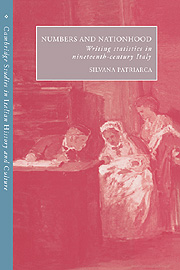Book contents
- Frontmatter
- Contents
- List of illustrations
- Acknowledgments
- Map 1 Italy during the process of unification
- 1 Introduction
- 2 A science for the “civilizing” of nations
- 3 The logics of statistical description
- 4 Official numbers
- 5 “Patriotic” statistics
- 6 The identity of the Italians
- 7 A map of the new nation
- 8 Center and periphery
- 9 Epilogue
- Appendix: Numbers of statistical publications
- Select bibliography
- Index
2 - A science for the “civilizing” of nations
Published online by Cambridge University Press: 14 October 2009
- Frontmatter
- Contents
- List of illustrations
- Acknowledgments
- Map 1 Italy during the process of unification
- 1 Introduction
- 2 A science for the “civilizing” of nations
- 3 The logics of statistical description
- 4 Official numbers
- 5 “Patriotic” statistics
- 6 The identity of the Italians
- 7 A map of the new nation
- 8 Center and periphery
- 9 Epilogue
- Appendix: Numbers of statistical publications
- Select bibliography
- Index
Summary
In 1826 in the pages of the Annali universali di statistica, the most important journal of the liberal and rationalist-oriented Lombard intelligentsia, the editor, Francesco Lampato, related the diffusion of an interest in statistics to the new “spirit of the time”: “Men, once bellicose, now industrious, address their curiosity to the progress of industry, where earlier they addressed it to the successes of war; and this is demonstrated by the general passion for statistics”. Having featured articles on the theory of statistics and statistical publications from its start in 1824, along with articles on political economy, geography, voyages, history, and so on (the complete title of the journal was Annali universali di statistica, economia pubblica, storia, viaggi e commercio), this journal also began in 1827 providing its readers with figures that could be of more direct interest to their commercial activities, such as those on the sale of silk in London, and on the condition of the silk market in other Italian states. From 1831 onwards a special section in the journal assembled quantitative information concerning various European as well as Italian states.
The “general passion for statistics” underscored by the editor of the Annali was not limited to Lombardy–Venetia, the most commercially developed area in Italy.
- Type
- Chapter
- Information
- Numbers and NationhoodWriting Statistics in Nineteenth-Century Italy, pp. 24 - 60Publisher: Cambridge University PressPrint publication year: 1996



